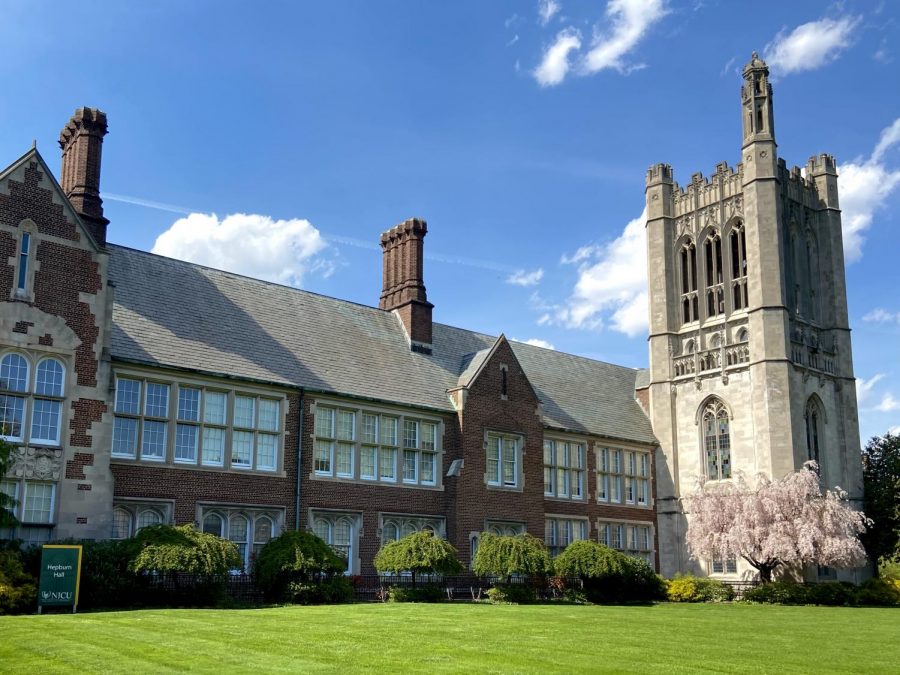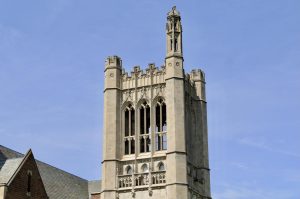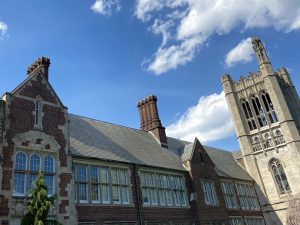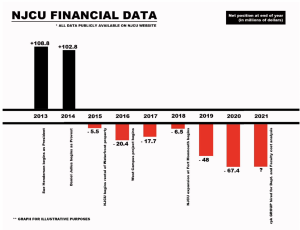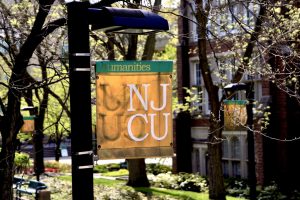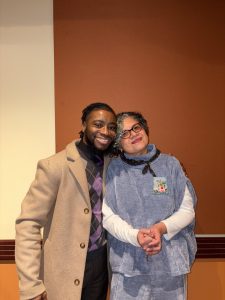No Confidence in President Henderson: What Happens Next?
Hepburn Hall, the administrative building at NJCU. Photo by Haresh Oudhnarine.
October 26, 2021
NJCU’s Board of Trustees says they support president Sue Henderson despite the recent vote of no confidence from the University Senate against her.

On September 28, Board of Trustees chair, Joseph F. Scott, said, “The NJCU Board of Trustees is aware the university senate passed a resolution this afternoon. The resolution itself was riddled with inaccuracies despite countless attempts to clarify these issues. The Board and I remain confident and supportive of the President and her administration, and the work we are doing in support of the institution’s mission.”
Anne Mabry, a professor of English as a Second Language, said, “Rather than simply publicly denouncing the democratic vote of the Senators, it is time for the Board of Trustees to take the lead in offering steps toward reconciliation. It is only in that spirit can we all accomplish the mission of the Institution.”
The vote of no confidence passed at the September 27 Senate meeting against Henderson with 30 senators voting “yes,” and 23 voting “no.” During the meeting, faculty and students expressed concern about the university’s finances and other issues.
Crystal Genthe, a freshman student senator, said during the meeting, “It is very important to me that NJCU keeps up with their intentions of putting their students first. If this is the case, the biggest question that comes to mind is, why are tuition rates rising during a global pandemic?”
Genthe also said, “Financial struggles are still a very common issue for many of our students. This issue should not be overlooked. We need to be more honest in regards to our school’s intentions sooner rather than later.”
Next Steps
Now that the vote has passed, Fran Moran, the president of the University Senate and chair of the Political Science department, explained in an email interview what’s next. He said that the Senate Administration Coordinating Committee (SACC) will have to present the no-confidence motion to the NJCU administration. Moran also said, “The Senate is an advisory body, so we offer advice to the administration, but ultimately the decisions come from the Administration as to what will happen with that advice.”
Typically, the Senate works to implement new programs. Once those get approved at SACC meetings, they move on to the Trustees for final approval, according to Moran.
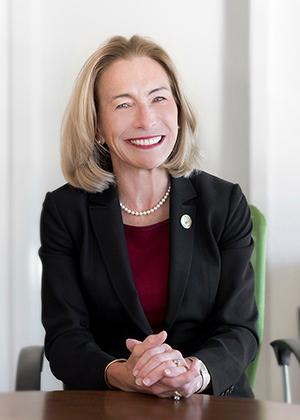
Moran said, “In the case of this particular motion [the no-confidence], we’ll present it to SACC and make a case to see it fully implemented. My prediction is that President Henderson will continue to serve in her position. The motion also asked that we present the motion to the Board of Trustees and we will send that over to them just so that they’re aware of it.”
At the October Senate meeting, Moran reported on the SACC meeting. He said the meeting was “animated, emotional, intense, but always civil.” He said that the Senate executive members expressed the frustrations senators have with unclear communication from the university, and about the university’s debt. Moran said that the administration outlined the “inaccuracies” of the no-confidence motion and expressed support from the Board of Trustees while the Senate executive members reiterated the faculty’s frustrations.
Moran said, “We did agree on smaller steps to get us moving in the right direction, specifically to improve communication. We agreed to foster closer working relationships between the Senate and administration, University Senate and SGA, and SGA with administration.” The consensus seemed to be that the administration said they will try to do better. Some faculty were not pleased with that answer and expressed that more should be done.
NJCU Counters Some Points from Senate Discussion
During the September Senate meeting, some faculty members said they were concerned about finances, the hiring of the rpk consulting firm, and whether the university is carrying out its mission statement and effectively serving students.
Joel Katz, a professor of Media Arts, began the discussion. He said, “Most of the challenges we’ve been facing on campus have to do with the finances. So, tuition hikes during the pandemic, furloughs, the presence of rpk on our campus, the change in COVID policy from one that seemed safe and sensible to one that seemed much more risky; all of these things really are corollary or resulted from financial challenges.”
Katz said there have been drastic drops in NJCU’s net financial position which the university has seen during Henderson’s time as president. He also said, “What the president really owes to the university, the university community, the senate, everyone, is transparency and accountability.”
However, a two-and-a-half-page statement sent on September 28 on behalf of NJCU by Ira Thor, the senior director of University Communications, outlined the “inaccuracies” of the no-confidence resolution. (It also included the statement from Scott.)
The NJCU statement said that the university’s net financial position was “taken out of context.” It said that the university’s total net asset position is at $83.8 million as of June 30, 2021.
The statement also said that the university has done “strategic refinancing and financial planning” which allowed them to increase liquidity. It explained why rpk was hired, how students have been assisted throughout the pandemic, and how NJCU has been praised by the governor and the Secretary of Higher Education for fulfilling its mission. The statement also said that the west-campus expansion was “first put into motion in the 1990,” which honors the university’s mission statement and that the administration “has not violated the principles of shared governance.”
To read the full statement, click here.
Mabry said, “The statement, furthermore, claims that President Henderson, the Administration, and the Board of Trustees ‘are completely attuned’ to our student population, the surrounding community, and the University’s mission. In fact, ‘complete attunement’ would imply that the Board of Trustees actually visit the campus to talk to faculty, staff, and students. It would imply that faculty, staff, and students understand why the Board of Trustees is building over 1000 luxury apartments at University Place, well out of the reach of our students’ pocketbooks. It would imply that a tuition freeze is more important than a tuition hike during the pandemic.”
Further Discussion at the Senate Meeting
Not all faculty who spoke were in support of the resolution. John Grew, a professor of Biology, said “personal issues” from a “certain group” of faculty members drive their motivation for the no-confidence motion. He said, “I doubt that the taxpayers who support our employment would consider these deliberations to be as important to our jobs as scholarships and grant-seeking, fundraising, enrollment building, program development.”
During the Senate meeting, Thyquel Halley, president of the Student Government Association, said, “We want leadership, and we want people in positions who uphold our motto which is ‘enter to learn, exit to serve.’”
Halley asked, “Holistically when we look at the big picture, are the students getting what we need to get out of this institution?” He also said, “I believe that no one person is solely responsible for all of the problems at this institution. If there are problems or concerns, there’s always a team, there’s not one person making decisions.”
Khadija Diop, a sophomore student senator, echoed Genthe’s statement on the tuition increases during the pandemic and spoke about transparency from the administration. Speaking about the apartments at University Place (where the West Campus Village is located), Diop said, “I wanted to know why it is that these apartments are made so expensive, so out of reach of student income? Especially knowing that NJCU is a university that prides itself on providing education to low-income students. Why are such expensive apartments being made and what can be done to make them more accessible to students like myself, to students that don’t have the money or can barely afford tuition?”
Laney Fox, a junior student senator and student-athlete, asked if anything has been done about the lack of transparency and financial issues in the past. Fox said, “Whatever happens with president Sue, you still have a Board of Trustees that agrees with her actions. Who is there to hold our Board of Trustees accountable?”



